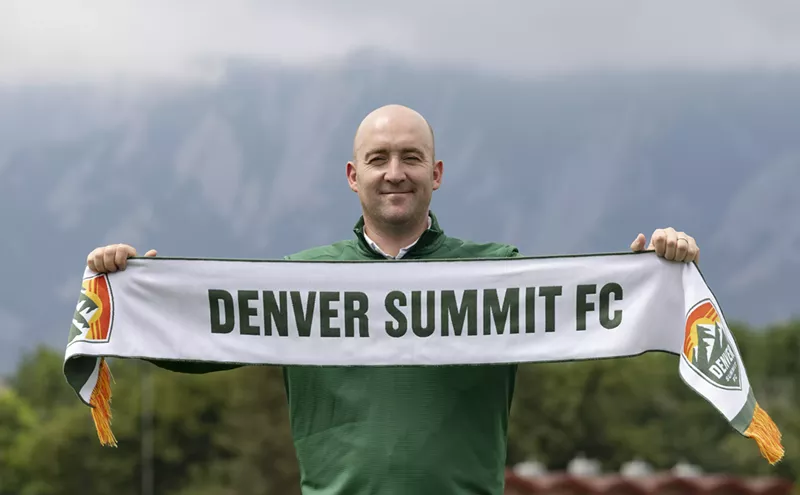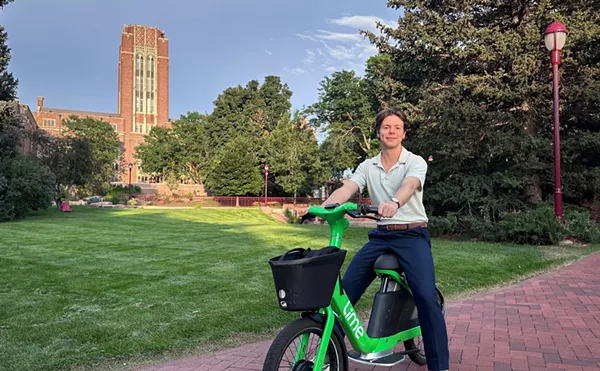It would be business as usual.
Even if the business-as-usual model became obsolete years ago. That's one of the lessons of The Rise of the Creative Class, whose astounding success has turned Florida -- a policy-wonk professor at Carnegie Mellon University -- into an economic rock star, this generation's Megatrendy eco-devo guru. During his talk here last October 25, Florida explained that creativity is now the driving force behind the economy. And that creativity comes from people -- people who today look for a place, not a company, to which they can belong.
"Cities need a people climate more than they need a business climate," Florida says. They need technology, but they also need talent and tolerance. In his book, he describes three kinds of high-tech communities: the "nerdistans" of the Silicon Valley; "latte towns" like Boulder, "with plentiful outdoor amenities"; and older urban areas whose rebirth is "fueled by a combination of creativity and lifestyle amenities." Leading creative centers have all three types. Leading creative centers like Boston, San Francisco, Austin and, yes, Denver: "The Denver region combines the university and lifestyle assets of Boulder with abundant skiing and the urban character of its LoDo district."
Florida experienced some of that character firsthand when Terri Taylor, membership manager of the Denver Partnership, sponsor of his October visit here, took him on a tour of LoDo hot spots. They dropped by Lime, Mynt, the Purple Martini and the bar at the Magnolia Hotel, where Florida was staying. "It was a Thursday night, and all the places were packed," she remembers. "He loved LoDo."
He returned to LoDo after his talk the next morning, joining a few select people -- including one John Hickenlooper -- for lunch. Florida talked more about his ideas, and Hickenlooper talked about some of his, including this odd notion he had of running for mayor. And then Florida was on to the next talk in the next town desperate to grab a piece of creative class.
By "creative class," he doesn't mean beret-wearing poets who sit in coffeehouses jotting free verse in their journals. The "creative class," Florida writes, "is a fast-growing, highly educated and well-paid segment of the workforce on whose efforts corporate profits and economic growth increasingly depend. Members of the creative class do a wide variety of work in a wide variety of industries -- from technology to entertainment, journalism to finance, high-end manufacturing to the arts. They do not consciously think of themselves as a class. Yet they share a common ethos that values creativity, individuality, difference, and merit." And they're currently responsible for 50 percent of this country's economic pie.
Two weeks ago, Florida was in his home town of Pittsburgh, talking to a convention of newspaper publishers and editors. Wearing flip-flops and jeans -- how creative is that? -- he assured his audience that he'd be in a suit the next day, when he was scheduled to address the U.S. Conference of Mayors at their confab in Denver. But right now he was back, however briefly, in the city where he'd discovered his theory of the creative class. It was a discovery made the hard way -- when Lycos, the software company he'd helped to create as part of a Pittsburgh business incubator, up and moved to Boston. Because that's where the people were. People were no longer going where the jobs were. The jobs were going to the people.
Since this was a convention of alternative-newspaper publishers and editors -- the sort who have to dress up for casual Friday (another corporate accommodation of the creative class) -- Florida's talk veered slightly from his standard spiel. Veered over to Washington, D.C., where thinking is far from creative. The 1990s were the 1920s all over again, he said. And the 2000s? "Welcome to the 1930s -- except the guy in the White House is not nearly as smart as Herbert Hoover."
Okay, said one audience member. So did he see any reason to be optimistic politically?
"There's a ray of hope in Denver," Florida responded. Just that week, one "John Hinkenlooper" had been elected mayor -- by 64 percent of the vote -- on a campaign "built around these themes." On a campaign that encouraged creativity, not negativity. A campaign that raised the discussion rather than lowering it. A campaign that emphasized Denver as a place worth protecting, worth celebrating.
Forget all the other theories. Hickenlooper's victory was a triumph of the creative class, a group of people from all walks of life who share a "common ethos that values creativity, individuality, difference, and merit." That values a town where people can start a software company. Or a newspaper. Or an art gallery. Or a brewpub. Hickenlooper's win was the inevitable outcome of all the changes Denver has seen over the past few decades, as people came to a place where they felt free to do what they wanted to do, to create a city where talent and tolerance -- "creativity is the great equalizer," Florida says -- were rewarded.
Hickenlooper's victory was inevitable, even if those movers and shakers couldn't see it last October, couldn't recognize what was happening all around them.
Florida sees it. "Most civic leaders" he writes, "have failed to understand that what is true for corporations is also true for cities and regions: Places that succeed in attracting and retaining creative-class people prosper; those that fail don't."
And so after he addressed Wellington Webb and the other mayors gathered at their annual conference, he took another trip to LoDo to visit one mayor-elect. This time, the talk was much more concrete than the conversation Hickenlooper and Florida had had almost nine months before. "He thought it was a validation of a lot of what he was talking about," Hickenlooper says of his victory. "We do share a lot of ideas."
And they also disagree on some. "I think that there are other competing forces that affect the economy," says Denver's next mayor. "We have the best environment in the world, but if we suddenly have PeopleSoft buy J.D. Edwards, it doesn't necessarily matter that we have the more diverse and culturally vital community -- we're going to lose a lot of jobs to California."
So even though Florida theorizes that companies will ultimately go where the people are, Hickenlooper doesn't want to wait. It's not enough to have art museums and bike paths and a lively LoDo; we still need jobs. "We need to be a hothouse of incubation," he says.
And then, for a moment, he's back on the campaign trail. "The Denver/Boulder area is one of the most appealing places for people to live," Hickenlooper says.
Especially now that it's a national ray of hope.
John Hickenlooper's election may have been a true triumph of the creative class, but don't tell that to the creative types who work at Denver's Office of Television and Internet Services.
Actually, you can tell them anything you want -- just don't expect an answer. Because last week, Byron West, director of Television and Internet Services for the city, effectively gagged her department with this e-mail message:
OTIS Staff,
Now that the 2003 Municipal Election is over and we know who will be taking office on Monday, July 21, OTIS is continuing our process to assist the newly elected officials with a variety of services and support. All staff contacts with any elected officials or their staffs must be coordinated through my office. This is very important work, and there are no exceptions to this process.
Although many of you come into contact with elected officials, as well as those about to take office, within your scope of work at OTIS, you do not represent the management of this agency. Any questions, concerns or ideas you may have regarding OTIS or that are shared with you must first be brought to my attention so that I can coordinate the resources of OTIS and respond as effectively as possible.
This requirement has always been in place within OTIS and is reflected within each of your PEPs, and I thought it would be appropriate to circulate this reminder about it to all of you at this time.
Before one of the OTIS staffers remembers that there's such a thing as free speech -- a right that extends to all Americans, including government employees. Even at an agency responsible for such a First Amendment triumph as Channel 8's Johns TV.












